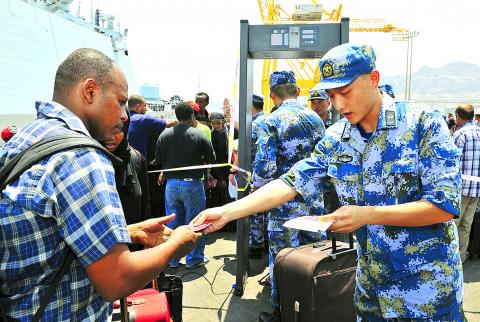The US Office of Naval Intelligence has released a new report on the Chinese People’s Liberation Army Navy (PLAN) saying that its “central priority” is to force the “unification” of Taiwan and China.
Given the pace of Chinese military modernization, the gap in military capability between Beijing and Taipei will continue to widen in China’s favor over the coming years, the report said.
Titled The PLA Navy: New Capabilities and Missions for the 21st Century, the report is the first of its kind issued by US Naval Intelligence in six years.

Photo: Reuters
“In addition to improving the traditional destroyer and frigate backbone of its fleet, the PLAN is on the verge of incorporating very different platforms that will greatly influence the operations of its future fleet,” the report found.
Nuclear-armed Jin-class submarines are poised to begin strategic patrols in the near future, putting Chinese intercontinental ballistic missiles to sea for the first time, it said.
“Against this backdrop of increasing military capability, China’s leaders appear increasingly willing to assert China’s maritime claims, even when such actions risk exacerbating tension with China’s neighbors,” the report said.
Chinese President Xi Jinping (習近平) continues to emphasize the importance of maritime power to enable China’s development, it added.
“Taiwan ‘reunification’ remains the main driver for military modernization,” it said.
According to the report, China views unification with Taiwan as an “immutable long-term goal and hopes to prevent any third party from intervening in what China asserts is an internal matter.”
China’s leaders have long emphasized their preference for peaceful unification, but also say that China is not prepared to wait indefinitely for a political resolution, the report said.
“For several decades, China’s naval investments have focused heavily on capabilities to deter Taiwan’s moves toward independence, to successfully reverse Taiwan’s actions should deterrence fail and — if necessary — to force ‘unification,’ even if the United States were to become militarily involved,” it said.
To achieve unification, the report says that China has built or acquired a wide array of advanced platforms, including submarines, major surface vessels, missile patrol craft, maritime strike aircraft and land-based systems employing new anti-ship cruise missiles and surface-to-air missiles.
China has also developed the world’s first anti-ship ballistic missile, specifically designed to attack enemy aircraft carriers.
“Chinese leaders hope that simply possessing these military capabilities will deter pro-independence moves or — should deterrence fail — permit a range of military options that can be tailored to the specific situation,” the report said.
It concludes that in contrast to its narrow focus of just a decade ago, the PLAN is evolving to meet a wide range of missions, including conflict with Taiwan, enforcement of maritime claims, protection of economic interests as well as counterpiracy and humanitarian missions.
“In the next decade, China will complete its transition from a coastal navy to a navy capable of multiple missions around the world,” the report said.
Although being prepared to “forcibly reunify [sic] Taiwan with the mainland” will remain a “driving force” behind China’s naval modernization, the report says the PLAN is simultaneously focusing resources on a growing array of other challenges.
It says: “Friction between China and its neighbors appears increasingly likely as Beijing seeks to deter rival activities and assert its own claimed rights and interests.”

The Ministry of the Interior (MOI) is to tighten rules for candidates running for public office, requiring them to declare that they do not hold a Chinese household registration or passport, and that they possess no other foreign citizenship. The requirement was set out in a draft amendment to the Enforcement Rules of the Public Officials Election and Recall Act (公職人員選舉罷免法 ) released by the ministry on Thursday. Under the proposal, candidates would need to make the declaration when submitting their registration forms, which would be published in the official election bulletin. The move follows the removal of several elected officials who were

The Republic of China (ROC) is celebrating its 114th Double Ten National Day today, featuring military parades and a variety of performances and speeches in front of the Presidential Office in Taipei. The Taiwan Taiko Association opened the celebrations with a 100-drummer performance, including young percussionists. As per tradition, an air force Mirage 2000 fighter jet flew over the Presidential Office as a part of the performance. The Honor Guards of the ROC and its marching band also heralded in a military parade. Students from Taichung's Shin Min High School then followed with a colorful performance using floral imagery to represent Taiwan's alternate name

FOUR DESIGNATED AREAS: Notices were issued for live-fire exercises in waters south and northwest of Penghu, northeast of Keelung and west of Kaohsiung, they said The military is planning three major annual exercises across the army, navy and air force this month, with the navy’s “Hai Chiang” (海強, “Sea Strong”) drills running from today through Thursday, the Ministry of National Defense said yesterday. The Hai Chiang exercise, which is to take place in waters surrounding Taiwan, would feature P-3C Orion maritime patrol aircraft and S-70C anti-submarine helicopters, the ministry said, adding that the drills aim to bolster the nation’s offshore defensive capabilities. China has intensified military and psychological pressure against Taiwan, repeatedly sending warplanes and vessels into areas near the nation’s air defense identification zone and across

A Chinese takeover of Taiwan would severely threaten the national security of the US, Japan, the Philippines and other nations, while global economic losses could reach US$10 trillion, National Security Council Deputy Secretary-General Lin Fei-fan (林飛帆) wrote in an article published yesterday in Foreign Affairs. “The future of Taiwan is not merely a regional concern; it is a test of whether the international order can withstand the pressure of authoritarian expansionism,” Lin wrote in the article titled “Taiwan’s Plan for Peace Through Strength — How Investments in Resilience Can Deter Beijing.” Chinese President Xi Jinping’s (習近平) intent to take Taiwan by force